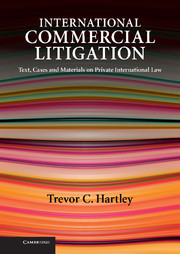Book contents
- Frontmatter
- Contents
- Table of panels
- List of figures
- Preface
- Acknowledgments
- Terminology
- Table of Latin phrases
- List of abbreviations
- Table of cases
- Table of cases (European Court of Justice, numerical order)
- Table of legislative instruments
- PART I STARTING OFF
- PART II JURISDICTION
- PART III FOREIGN JUDGMENTS
- 13 Introduction to Part III
- 14 EC law
- 15 English law: jurisdiction
- 16 English law: defences
- 17 The Canadian conflicts (judgments) revolution
- 18 US law: some highlights
- PART IV PROCEDURE
- PART V CHOICE OF LAW
- PART VI EXTRATERRITORIALITY
- Bibliography
- Index
13 - Introduction to Part III
from PART III - FOREIGN JUDGMENTS
- Frontmatter
- Contents
- Table of panels
- List of figures
- Preface
- Acknowledgments
- Terminology
- Table of Latin phrases
- List of abbreviations
- Table of cases
- Table of cases (European Court of Justice, numerical order)
- Table of legislative instruments
- PART I STARTING OFF
- PART II JURISDICTION
- PART III FOREIGN JUDGMENTS
- 13 Introduction to Part III
- 14 EC law
- 15 English law: jurisdiction
- 16 English law: defences
- 17 The Canadian conflicts (judgments) revolution
- 18 US law: some highlights
- PART IV PROCEDURE
- PART V CHOICE OF LAW
- PART VI EXTRATERRITORIALITY
- Bibliography
- Index
Summary
Principles
The principle of res judicata requires that, unless the proceedings were flawed in some way, the successful party should not have to fight the case again. Once it is decided, that should be the end of the matter.
In the international context, this means that, unless there is a legitimate objection to the proceedings, a litigant should be able to rely on a judgment obtained in another country. If the judgment is for the defendant, the claimant should not be able to sue him again. If the judgment is for the claimant, he should be able to enforce it. In neither case should the matter be reopened.
However, this applies only if the foreign proceedings were just and fair. This raises, first and foremost, the question whether it was reasonable for the foreign court to hear the case. Was it reasonable for it to take jurisdiction? This raises the same issues as were considered above, though in a different situation. Now it is another court deciding whether the first court should have assumed jurisdiction.
Procedural questions, usually subsumed under the terms ‘natural justice’ or ‘due process of law’, are another issue. Other matters might also be relevant, but if the court asked to recognize the judgment goes much further than this it will come close to reopening the case. This would defeat the object of the exercise.
- Type
- Chapter
- Information
- International Commercial LitigationText, Cases and Materials on Private International Law, pp. 319 - 321Publisher: Cambridge University PressPrint publication year: 2009



